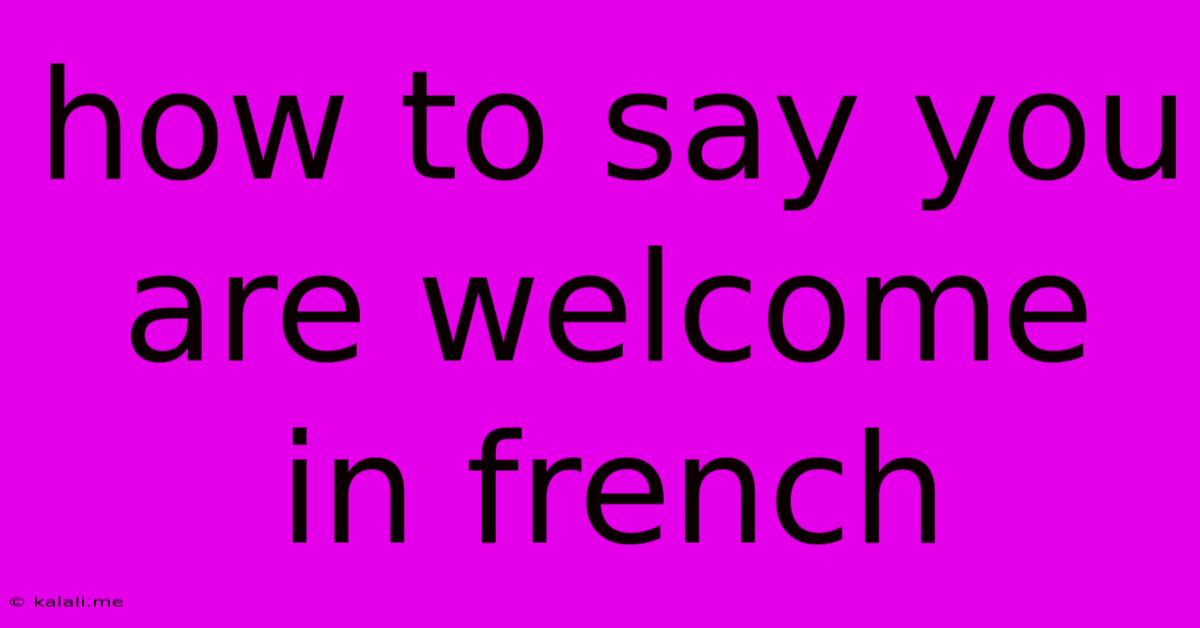How To Say You Are Welcome In French
Kalali
Jun 06, 2025 · 3 min read

Table of Contents
How to Say "You're Welcome" in French: More Than Just "De Rien"
So, you've mastered "bonjour," "merci," and maybe even a few more French phrases. But what about that all-important response to "thank you"? Knowing how to say "you're welcome" in French is crucial for polite conversation. While "de rien" is the most common response, French offers a variety of ways to express gratitude for a thank you, each with its own nuance and context. This guide will explore the most popular options, helping you choose the perfect response for any situation.
This article will cover several ways to express "you're welcome" in French, considering different levels of formality and the overall context of the conversation. We'll also look at some common mistakes to avoid.
The Most Common Phrase: "De Rien"
The most straightforward and widely accepted way to say "you're welcome" in French is "de rien." This literally translates to "of nothing," implying that what you did wasn't a big deal. It's perfectly suitable for most casual situations and is a safe bet in almost any context. Think of it as the equivalent of a simple "you're welcome" in English.
More Formal Options: "Il n'y a pas de quoi" and "De rien du tout"
For more formal settings or when you want to express a bit more politeness, you can use "il n'y a pas de quoi." This translates to "there's nothing for it" or "it's nothing at all." It's a slightly more emphatic way of saying "you're welcome" and conveys a greater sense of ease and generosity.
Similarly, "de rien du tout" adds emphasis to "de rien," meaning "not at all" or "absolutely nothing." This phrase is also suitable for formal situations and expresses a more significant level of politeness.
Adding a Touch of Warmth: "Avec plaisir" and "Je suis content(e) de vous avoir aidé(e)"
For situations where you genuinely enjoyed helping someone, you can use "avec plaisir," meaning "with pleasure." This conveys a sense of happiness and willingness to assist, making it a more personal and warmer response.
Alternatively, you could say "Je suis content(e) de vous avoir aidé(e)," which translates to "I'm happy/glad to have helped you." This is a longer, more expressive phrase perfect for showing genuine appreciation for the opportunity to assist. Remember to use "content" if you are male and "contente" if you are female.
Phrases to Avoid (or Use Cautiously): "Pas de problème"
While "pas de problème" literally translates to "no problem," it's generally better avoided when responding to a "thank you" in French. Although widely understood, it's considered slightly less polite than the other options and can sometimes sound dismissive. It's better suited for situations where someone is apologizing for a minor inconvenience, rather than thanking you for a favor.
Mastering the Nuances of French Politeness
Choosing the right phrase depends on context. Consider your relationship with the person you're speaking to, the formality of the situation, and the level of effort involved in your assistance. Learning these nuances is a key step towards sounding more natural and fluent in French.
By mastering these different ways to say "you're welcome" in French, you’ll not only sound more fluent but also demonstrate a greater understanding of French etiquette and politeness. Practice using these phrases in different situations, and you’ll quickly find yourself communicating with ease and grace.
Latest Posts
Latest Posts
-
What Is The Round Thing On My Ceiling
Jun 06, 2025
-
Create 4 Input Nand Using Two Input Nand Gates
Jun 06, 2025
-
How To Fix A Door Knob Hole
Jun 06, 2025
-
How To Protect A Pvc Drain Pipe Behind Drywall
Jun 06, 2025
-
Solving A System Of Differential Equations
Jun 06, 2025
Related Post
Thank you for visiting our website which covers about How To Say You Are Welcome In French . We hope the information provided has been useful to you. Feel free to contact us if you have any questions or need further assistance. See you next time and don't miss to bookmark.